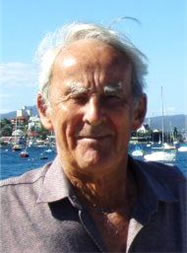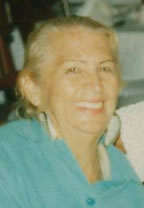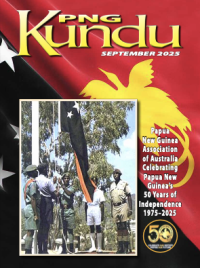Richard Kyle Gault: Ros Gault
 Richard Kyle Gault(known to all in PNG as “Dick” Gault) was born at Ardmee, 146 Belair Road, Hawthorn (Lower Mitcham), South Australia, to Dr Arthur Kyle Gault (“Kyle”) and Ruth Marjorie Hawker. He was the eldest of three children, having 2 sisters, Yolande and Averil. Both his grandfathers were Doctors of Medicine (Grandfather Walter Hawker practicing for a week then having to take up his share of the Bungaree Station pastoral estate, Anama) and he lived in the home that included his grandfather’s and father’s medical practice in the North Wing, five acres of gardens, a tennis court, milking cow, chickens and horse stables. Dick attended the private prep school in Adelaide, Queens College and was a boarder of Saint Peter’s College for his primary and secondary schooling.
Richard Kyle Gault(known to all in PNG as “Dick” Gault) was born at Ardmee, 146 Belair Road, Hawthorn (Lower Mitcham), South Australia, to Dr Arthur Kyle Gault (“Kyle”) and Ruth Marjorie Hawker. He was the eldest of three children, having 2 sisters, Yolande and Averil. Both his grandfathers were Doctors of Medicine (Grandfather Walter Hawker practicing for a week then having to take up his share of the Bungaree Station pastoral estate, Anama) and he lived in the home that included his grandfather’s and father’s medical practice in the North Wing, five acres of gardens, a tennis court, milking cow, chickens and horse stables. Dick attended the private prep school in Adelaide, Queens College and was a boarder of Saint Peter’s College for his primary and secondary schooling.
In his early teens, Dick’s parents divorced. The social stigma of such an event in the early 1930s, in a small close community, was profound, as was the emotional effect of a split life. His father, Kyle, was a workaholic doctor, whom he loved dearly and he spent time with him on his patient rounds, preparing medication, making pills and in a little spare time, sailing on his father’s yacht. At his father’s home, he was dearly loved by and loved his nanny, Nellie Slocombe, and cook, Dot Applebee. In boarding school holidays he also spent time with his mother and sisters, either at Derrymor, his grandfather Walter Hawkers’ summer home in the Adelaide Hills or at Anama, the sheep station near Clare.
After finishing school, he worked briefly for Austral Elevator Company in Adelaide and, showing good aptitude with the machinery, was offered a training course in England. This was not to be due to the war breaking out.
The involvement of Australia in WWII saw Dick enlist at the age of 18 in the RAAF on 20 May 1941 and he was proud of the fact that his number was 39424 (low in the series issued, representing early enlistment). Dick served his country for just short of six years (discharging at age 23 on 26 February 1946) at air force bases at Laverton, Point Cook, Pt Pirie, Hamilton, Geraldton, Kalgoolie, Pearce, at Yannarie Station, far northern WA, conducting armament instruction, bombing and air gunnery training, repair and salvage. He also served overseas as a Leading Aircraftsman in 61 Operational Base Unit, performing Japanese air surveillance at Tarakan and Morotai (Indonesia, then Dutch territory1) and Tawi Tawi Island (Philippines). It will come as no surprise to anyone that his family knew very little of Dick’s war service and were told by him as children and teenagers that he had served as a “cook”. They knew this wasn’t true, because he didn’t care for cooking and “couldn’t boil water without burning it” !
Upon discharging in Brisbane off the US Stamford Victory from Tarakan, Dick spent some time buying and selling war surplus including trucks and boats in Queensland and Northern Territory.
In his travels he heard that there was work in the Territory of Papua New Guinea (TPNG) and so hopped on the first ship carrying civilians heading to TPNG. Here began an adventurous and rewarding 45-46 years of Dick’s life. In Manus he worked for the US Vanil Corporation, supervising the loading of war equipment being returned to the US. At one stage, he salvaged war surplus barges, etc., in Manus and sold them at a profit. With his RAAF experience and life-long interest in aircraft, Dick also had a job as Manager of Mandated Airlines, based in Lae.
Before long he headed to Rabaul on the island of New Britain and started a number of entrepreneurial vocations, including a construction/building company (building the Shell Co. Managers’ house, houses in Bay Road, the family home on the plantation and in town, etc.), and leasing and operating the plantation Toriu where he even had a trade store and sewed up “lap laps” for sale! Dick also worked for Burns Philip stevedoring for a shilling a day! All Dick’s skills were self-taught or gathered on the job.
 At about this point in time he met and fell in love with Joyce Beryl Barry. Dick had bid for and won a contract to construct a large freezer for Anderson’s butchery where Joyce was the Manager. Needless to say, Joycie was the “absolute love of Dick’s life”, completing his circle of happiness. She was his North, his South, his East and his West. They married in Sydney in December 1955, having the wedding reception at Alan and Jenny Anderson’s home, Warana. Returning to Rabaul, they lived initially in Bay Road in one of the houses Dick built, then bought Warenvula Plantation from Mrs Bignell (of the hotel fame), cleared the bush to build a house and plant cocoa and coconuts. Warenvula was approximately an hour’s drive from Rabaul and half an hour from Kokopo, on the lower reaches of the Warengoi River and overlooked the sea of the St George’s Channel. Joyce was renowned for her charity work, magnificent garden and spectacular entertaining. Dick and Joyce’s three children Richard, Rosalind and Roland were all born at Vunapope Hospital in Kokopo with Dr Hubert Lunger in attendance and the family lived a fantastic life on the plantation, until a kerosene refrigerator malfunctioned and burnt the house down in 1973.
At about this point in time he met and fell in love with Joyce Beryl Barry. Dick had bid for and won a contract to construct a large freezer for Anderson’s butchery where Joyce was the Manager. Needless to say, Joycie was the “absolute love of Dick’s life”, completing his circle of happiness. She was his North, his South, his East and his West. They married in Sydney in December 1955, having the wedding reception at Alan and Jenny Anderson’s home, Warana. Returning to Rabaul, they lived initially in Bay Road in one of the houses Dick built, then bought Warenvula Plantation from Mrs Bignell (of the hotel fame), cleared the bush to build a house and plant cocoa and coconuts. Warenvula was approximately an hour’s drive from Rabaul and half an hour from Kokopo, on the lower reaches of the Warengoi River and overlooked the sea of the St George’s Channel. Joyce was renowned for her charity work, magnificent garden and spectacular entertaining. Dick and Joyce’s three children Richard, Rosalind and Roland were all born at Vunapope Hospital in Kokopo with Dr Hubert Lunger in attendance and the family lived a fantastic life on the plantation, until a kerosene refrigerator malfunctioned and burnt the house down in 1973.
In an unconfirmed sequence of events, Dick built and operated a desiccated coconut factory at Rapopo that also produced coir fibre mattress material. He financed a team of men escaping the ravages of war in Yugoslavia (Bruno Tasic, Emile and Steve) as crocodile shooters. He traded crocodile skins, troccus and green snail shells (for buttons) so successfully to Paris and Japan that he opened a trading office in Tokyo in the early 1960s. Dick continued to buy and sell scrap metal (WWII surplus) under licence for over 30 years.
The sedate life of the planter was not for Dick and with his keen interest in machinery he went into the heavy equipment contracting, saw milling, timber exporting and veneer manufacturing businesses. In 1966 he purchased two Japanese 120-foot fishing boats to start a tuna fishing business. This venture didn’t get off the ground, but the boats were put to good transport use in the logging business. The New Britain Queen (named after Joyce) went up on a reef off Cape Lambert one wild stormy night with Ian MacDougall at the helm. The last time the New Britain Princess was seen, a tourist visiting Rabaul sighted a wreck on a beach at G&M Slipway and identified it as a WWII wreck! Sometime in the 60s, Dick expanded into Bougainville, opening a sawmill on Aropa Plantation and soft drink factory in Kieta, and owned a block of residential units on the foreshore of Kieta. Dick also imported balsa seed from Ecuador (planting a stand of trees on Warenvula and shared seed with DAL Kerevat) and was instrumental in (inadvertedly) starting the now booming balsa business in PNG.
From the 1970s to his departure from PNG upon the sale of his business interests in 1993, Dick’s core business was sawmilling and export logging. Prior to PNG’s independence, the uncertainty created by the Australian Government and the UN for foreigners wanting to remain in the country saw Dick pursue a sawmilling venture in Fiji and for many years a “family home”, that we never lived in, existed in Suva. When TPNG gained independence, both Dick and Joyce were amongst the first naturalised citizens, considering PNG “home”. They had no assets outside the country. Over the years some business ventures failed, there were tough times and good times. But Dick would soldier on; come what may, putting in the hard yards to provide for his family.
In business, Dick was a self-propelled, sole operator, what he would call a “self-starter”. He admired and encouraged entrepreneurial spirit. He was one of the hardest working men in the islands. His day would start at 5.00am (and earlier) and end at 6.00pm, six days a week covering thousands of kilometres a year from home to the sawmill, town and the plantation (an hour’s car journey each way), sometimes 2 and 3 times a day. Half a Sunday was generally billing and correspondence day. How mobile phones would have changed that! Dick had no formal training in business procedures and many could testify to machinery being operated on the “smell of an oily rag” and to within an inch of its life, and beyond! Who could ever forget that sight of a single cab vehicle moving along the Kokopo Road that was barely distinguishable as a vehicle because it was so laden down with sawn timber from the Warengoi sawmill for the sales yard in Rabaul!
Dick was proudly an elected member of the Committees of the peak timber bodies of Papua New Guinea: The Forest Industries Association and the Forest Industry Council in the 1970s and early 1980s, at a time when the industry was well regulated. He represented PNG on several trade missions internationally. His knowledge of the forest species of PNG was extensive. And he sustainably logged the same valley for his Warengoi sawmill (which is still known today by the locals as “Dick’s place”) for over 30 years.
Dick was brought up to be a “perfect gentleman”, still thanking the nurses for their care the day before he passed away, despite hardly being able to speak. Dick had a community spirit serving on the timber industry boards, Rabaul Town Council for a term, providing machinery/labour gratis to create school and club playgrounds and free timber/material for many charitable causes.
Dick was selfless (never spent a cent on himself), kind and worked for and loved his family, including providing the best education for his children, he could. He treasured his friendships, and although he didn’t have time for many close friends in PNG, with his ‘retirement’ to Australia, formed and maintained many special affinities.
Dick’s health was remarkable. Between 2008 and 2009 Dick spent only a few nights in hospital. 2010 was not such a good year. The breathlessness increased markedly and on 26 May, Dick returned from pruning lantana off the driveway (having walked a kilometre) and proceeded to have what we can only assume was a TIA (stroke). A short visit to Murwillumbah hospital for 11 days in December to get assessed for oxygen assistance and the treatment of a urinary tract infection was over on 22 December and Dick spent Christmas and his last days at home in his bed surrounded by the family who loved him and whom he loved (at least the ones who made it across the causeway before we were landlocked once again!).
Dick would want me to thank once again from the bottom of his heart, all those who touched his life.
Richard Kyle Gault (Snr)/Dick was Number 1 and One in a Trillion.
1. Dick, in amazement, received a few Guilders a month from Queen Wilhelmina of the Netherland for defending her territory!


